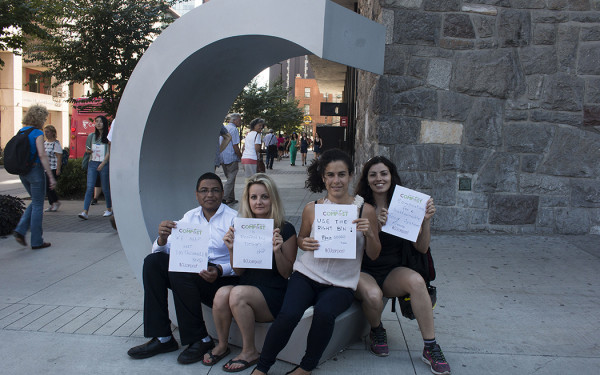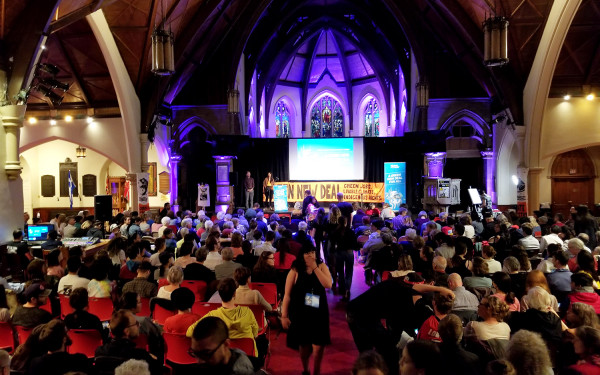Is Overdevelopment Just Par for the Course?
The Battle Over Turning Meadowbrook Golf Course Into a Park
For 25 years, activists and housing developers have fought over the Meadowbrook Golf Course. On Jan. 29, Montreal’s agglomeration council finally waded into the debate, approving a new land-use plan that calls for Meadowbrook to be rezoned from “residential” to “large green space or recreational.”
“By rezoning the land to prohibit development, the Land Use and Development Plan opens the door for a future Meadowbrook Park,” said Campbell Stuart, a spokesperson for Friends of Meadowbrook, a group that has been fighting to protect the green space for over two decades.
Not far from Concordia University’s Loyola campus, the golf course straddles the border between the suburb of Côte Saint-Luc, an independent municipality, and Montreal’s Lachine borough. Côte Saint-Luc had rezoned the land to protect it from development, but plans had been in the works to build over 1,500 units on the Montreal side of the site.
The years-long battle around Meadowbrook has involved allegations of illegal lobbying, lawsuits against the cities of Montreal and Côte Saint-Luc and the “colonizing” of microphones by activists at public events.
Decades of activism
Beginning in the late 1980s, residents began to form a grassroots movement with the goal of preserving the 57-hectare golf course as a green space. Canadian Pacific Railway owned the land on which the Meadowbrook Golf Course sits, and the company’s real-estate arm, Marathon Realty, sought to build a residential development on the links.
“We were demonstrating and preparing leaflets and flyers, basically telling people ‘Buyer Beware’ because of the proximity to the train tracks and the petrochemical industries in Lachine,” said Dida Berku, who was first elected to Côte Saint-Luc’s city council in 1990.
Environmental reasons and the site’s proximity to CP’s rail yards make it “not appropriate for development,” she said, adding that residents of Côte Saint-Luc have frequently complained about the noise, vibration and pollution caused by the railway.
In 2000, Côte Saint-Luc’s city council voted to rezone the land as recreational, squashing plans for housing development and prompting the developer to file a $20-million lawsuit against the municipality.
Then, in 2006, real-estate development firm Groupe Pacific bought the land to build 1,600 residential units and 4,500 square metres of commercial space on the Lachine portion of the site.
_900_600_90.jpg)
‘Great plan but really the wrong place’
Stuart became involved in Friends of Meadowbrook in 2010, after his term as mayor of Montreal-West ended. Also an independent municipality, Montreal-West butts up against the golf course. At the time, the developer was “getting a very friendly reception from the City of Montreal,” he says.
Stuart admits that Groupe Pacific had a “great plan,” but he added the project was to be built in “the wrong place.” One member of Friends of Meadowbrook, he noted, has a favourite saying: “Low-flush toilets are not a substitute for green space.”
Activists held a meeting in a school and a couple hundred people showed up. The message organizers told attendees was that construction was “imminent” and something had to be done about it, according to Stuart.
Among the environmental groups that voiced their support for protecting Meadowbrook were household names like the Sierra Club’s Quebec wing, Greenpeace and the David Suzuki Foundation. Stuart says this expanded the interest group that wanted Meadowbrook to be rezoned from “a local group of citizens” to “everybody on the island and beyond.”
In 2010, municipal political parties Projet Montréal and Vision Montreal also came out in support of rezoning.
“By the end of the summer, I would think that we could safely say Groupe Pacific had lost all of their allies, with the exception of the building community,” Stuart said.
Allegedly illegal lobbying, lawsuits
Meanwhile, Stuart filed a complaint against Groupe Pacific with the province’s lobbying commissioner. Groupe Pacific, he alleges, was meeting with city officials, despite the fact that it had not registered as lobbyists.
In 2006, the company hired Suzanne Deschamps as their Vice-President Legal. She had formerly headed up the paramunicipal Société de développement de Montréal. “They hired an insider from Montreal to lobby Montreal, which is unethical,” Stuart says.
Deschamps did not respond to The Link’s requests for an interview before press time, but she has previously denied wrongdoing.
Stuart says it took Quebec’s lobbying commissioner three years to investigate the matter. The commissioner found the company engaged in 13 instances of lobbying while not registered, which is required by law.
The company was not sanctioned, but it was required to register and the registration was made “retroactive for six months,” according to Stuart.
In November 2010, the City of Montreal and the borough of Lachine decided the costs of building infrastructure for sewage and water were too high for them to approve the project.
Groupe Pacific responded with a lawsuit against the City of Montreal almost three years later, seeking $44 million for not being allowed to build, including approximately $800,000 in damages.
“They are alleging that their rights to build on it were frustrated and that frustration by the City of Montreal amounts to a disguised expropriation,” says Stuart. “They’d like the judge to order a formal expropriation of the southern portion at a value of $43 million. They paid $3 million [for the land].”
Stuart, a lawyer, says the lawsuit is “wrong in law, wrong on the facts and wrong because it’s not worth $44 million.” He hopes city officials will stand their ground and not negotiate.
When it purchased the land in 2006, Groupe Pacific also took over the earlier lawsuit filed against Côte Saint-Luc. Berku said the municipality’s city council has decided to “revive the dead” by asking the court to dismiss the case. A decision should be made in April.
From a golf course to a park
The decision to rezone the land from residential to recreational guarantees that Meadowbrook will not become the site of Montreal’s latest large condo development, but it also falls short of activists’ demands that the site become a public space accessible to all Montrealers.
Lachine city councillor Jean-François Cloutier says it’ll now be up to the agglomeration council, not the borough, to decide how to proceed. The agglomeration council is composed of representatives from the City of Montreal and the 15 independent municipalities on the island, and one of its responsibilities is acquiring and maintaining the island’s large nature parks.
Cloutier says the lawsuits will likely have to be resolved before the agglomeration council can proceed. Any future park will have to provide better access to the site for residents of Lachine.
“Lachine doesn’t have access to [the golf course] presently, other than passing through Montreal-West and Côte Saint-Luc,” Cloutier says. “There’ll have to be either a footbridge or an underground passage under the railway or, from highway 20, an access ramp that’ll pass over the railway.”
“Now we have to start working with the boroughs, with the agglomeration, with the parks department, with the neighbouring towns. There’s a lot of work to do,” Stuart says.
“I think that people are ready for a park on Meadowbrook.”

_900_245.png)


_600_375_90_s_c1.jpg)


